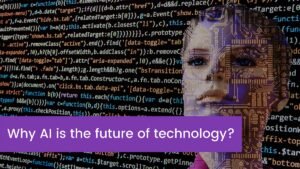Artificial Intelligence (AI) is one of the most revolutionary and controversial technologies of the 21st century. It has the potential to change our lives in ways we can barely imagine, but it also poses significant risks to our future.
In its simplest form, AI is a branch of computer science that deals with creating intelligent machines. This can be anything from a simple chatbot to a self-driving car. AI has the ability to learn and improve over time, making it potentially much more powerful than traditional computer programs.
AI is already having a profound impact on our world. It is diagnosing and treating diseases, designing more efficient factories, and creating new artwork. As AI continues to develop, it will increasingly automate high-level decision-making. This could have a huge impact on the economy, as well as on our personal lives. For example, AI could make financial decisions, manage our energy use, or even choose our mates.
What is Artificial Intelligence?
Artificial Intelligence (AI) is the study and development of computer systems that can learn and work for themselves. This involves creating algorithms, or sets of rules, that can sort, study, and draw predictions from data. It also involves making decisions based on that data and taking actions to achieve the desired goal.
AI has been around for centuries in one form or another, but it has only become truly advanced in the last few decades. This is thanks to the rapid expansion of computer power and data storage capacity. With more data to work with, and more processing power to analyze it, AI systems have become much more sophisticated.
Today, you will see AI in a variety of fields including medicine, finance, manufacturing, and even law. It also helps in solving some of the world’s most pressing problems, such as climate change and energy insecurity. In the future, AI is likely to become even more ubiquitous and important, as we increasingly rely on it to help us make decisions and take actions.
History Of Artificial Intelligence
The history of artificial intelligence (AI) can be traced back to ancient Greece when Aristotle proposed the idea of intelligent machines. In the early 19th century, AI was developed as a branch of philosophy and psychology, and AI made early attempts to build machines that could reason and learn like humans. However, it was not until the mid-20th century that AI began to be developed as a scientific discipline, with the advent of computers and the development of new programming techniques.
During the 1950s and 1960s, AI made great strides with the development of programs that could solve complex mathematical problems and play chess. However, AI also began to be used in military applications, such as battlefield decision-making and missile guidance. This led to fears that AI could be used for destructive purposes, and the field began to lose its funding and public support.
In the 1980s and 1990s, AI experienced a renaissance as new approaches, such as neural networks and machine learning, were developed. AI began to be used in a variety of applications, such as expert systems, natural language processing, and robotics. Today, AI use in a wide range of domains, from medicine to finance, and its impact will grow year by year.
How Will The Forthcoming AI Revolution Impact Society And Firms?
The rise of artificial intelligence will be the biggest event in human history. There is no doubt that artificial intelligence will impact every aspect of our lives. Here are some of the ways that the artificial intelligence revolution will impact society and firms:
AI Will Change The Way We Work
Companies are already using artificial intelligence to automate tasks and make employees more productive. For example, IBM has developed a software called Watson which can help employees with research tasks. In the future, artificial intelligence will automate more and more jobs. This will impact the way firms operate and the way society functions. You can find the best AI tools that suit your requirements and you can find AI Tools by reading reviews.
AI Will Change The Way We Live
Smart home devices, such as the top smart speaker Amazon Echo and Google Home, are becoming more popular. These devices use artificial intelligence to perform tasks such as controlling the lights and playing music. The top-rated smart locks also use AI systems for home safety. In the future, artificial intelligence will become even more integrated into our lives. We will rely on artificial intelligence to perform more tasks for us.
Even now, you can also have the best smart thermostat that helps in maintaining the temperature of your house, be it cold or warm efficiently.
AI Will Change The Way We Interact With Each Other
We are already seeing the impact of artificial intelligence on the way we interact with each other. For example, many people now use chatbots to communicate with businesses. In the future, artificial intelligence will become even more involved in our interactions. We will interact with artificial intelligence agents in many aspects of our lives.
AI Will Change The Way We Make Decisions
Artificial intelligence is already helping humans make better decisions. For example, Google uses artificial intelligence to help decide which ads to show us. In the future, artificial intelligence helps us in making decisions. We will rely on artificial intelligence to make decisions in many areas of our lives.
AI Will Change The Way We Think
Artificial intelligence is changing the way we think. For example, Google’s DeepMind artificial intelligence system is capable of forming abstract concepts. In the future, artificial intelligence will become even more involved.
Advantages and Disadvantages of Artificial Intelligence?
Advantages
The Positive impact of Artificial Intelligence is limitless. With the help of Artificial Intelligence, we can do things that were once impossible, such as understanding and responding to human emotions, making decisions, and even creating new forms of art.
In addition, Artificial Intelligence has had a positive impact on the economy by creating new jobs and industries, and by helping businesses to be more efficient and productive. AI also addresses social issues, such as poverty and inequality. For instance, AI also developing new educational technologies that can help to close the achievement gap and to create new opportunities for people in developing countries.
Overall, the Positive impacts of Artificial Intelligence are far-reaching and transformative. With the help of AI, we are discovering new ways to improve our lives and our world.
Disadvantages
The negative impact of Artificial Intelligence is that it has the potential to drastically change the way our world works. It could lead to massive unemployment, as machines take over many jobs that humans have traditionally done. It could also result in the concentration of power and wealth in the hands of a small number of people who control the technology. AI can also be used to create “perfect” humans who are free of disease and aging, which can lead to immense inequality between those with access to technology and those without.
Conclusion
Artificial intelligence has revolutionized the way we live and work. It has the potential to transform every industry and sector, and its impact is already across the globe. Artificial intelligence concludes that it is still in its early developmental stages, but its potential is already evident. With the right policies and regulations in place, artificial intelligence can help us solve some of the world’s most pressing problems and make our lives better.
AI will probably have an even greater impact on our society. It has the potential to help us solve some of the world’s most pressing problems, such as climate change and healthcare. It could also make our lives easier and more enjoyable, by automating tedious tasks and providing us with personalized recommendations.




